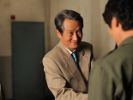Eye For Film >> Movies >> National Security (2012) Film Review
Kim Jong Tae is an activist, or at least was formerly so - a member of South Korea's democracy movement, organising among a community of those opposed to the excesses of their government. He is arrested. He is interrogated. "If you're stubborn, you'll suffer more".
He is stubborn. It's a tremendous physical performance from Won-sang Park. Western audiences will be most familiar with him as Sgt. Cook from R-Point. He's collaborated before with director Ji-yeong Jeong, in 2011's "unbowed" - here he is not just bowed, but beaten, broken - this is harrowing stuff.

There are any number of what Zero Dark Thirty would call "enhanced interrogation techniques": sleep deprivation, starvation, waterboarding, all increasingly disturbing to witness, and not just for the audience. While the senior officers involved are anxious for the paperwork to line up, the grunts who do the lifting veer from asking his advice in matters of the heart to resenting him for what they are suffering alongside him. It's a discomfitingly human moment in a tiled monument to inhumanity. Each of the performances adds to the whole but it's Won-sang Park who carries the film on his increasingly damaged shoulders.
The original title of the film was Namyeong-dong 1985, that being the name of the district in Seoul is where Korea's intelligence services were based. And the year. That's not the only parallel with Buenos Aires 1977 - both give us a character from arrest through interrogation, both rest on a fantastic central performance, both are difficult to match but compelling, affecting.
As the interrogators, Myung Gye-nam and Lee Geung-young balance zeal and disdain and bureaucratic concern admirably - Lee plays "The Undertaker", a specialist. Well-directed, using Shin Min's music to good effect, it is The Undertaker's whistling that truly haunts - while lines like "You got blood on the paper. Write it again." will stay with you", the use of melodies from "Johnny I Hardly Knew Ye" and Bella Ciao is deeply ironic.
In the current climate National Security has an obvious timeliness - while it's further grounded in reality with a coda inspired by the consequences of Kim Jong Tae's incarceration, and even testimony from actual survivors, current events have perhaps given it even greater relevance. As it becomes clear that the truth is less important to the security service's narrative and their means to create it than anyone's well-being, the film itself manages to say something both true and powerful.
Reviewed on: 26 Jun 2013















